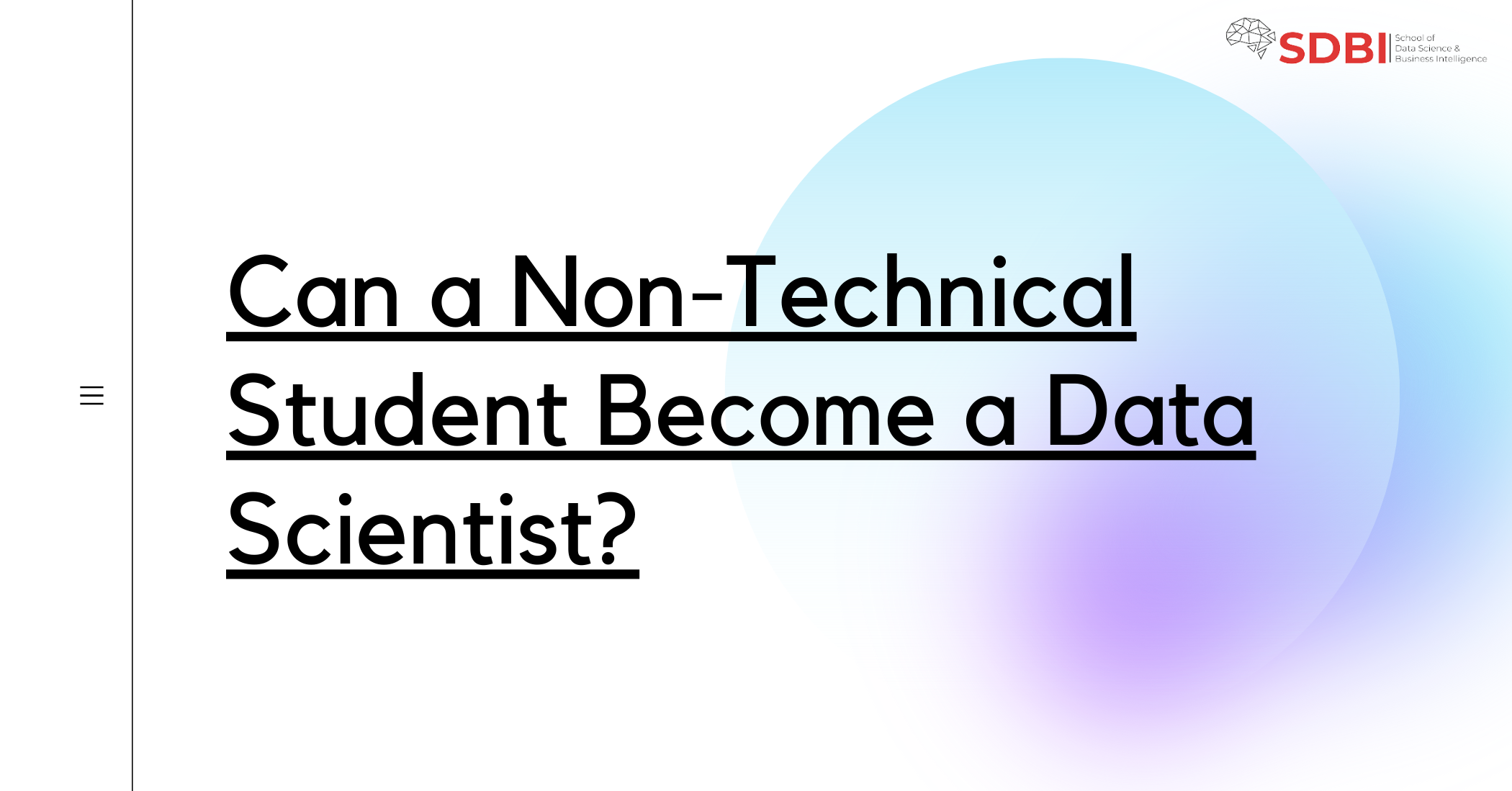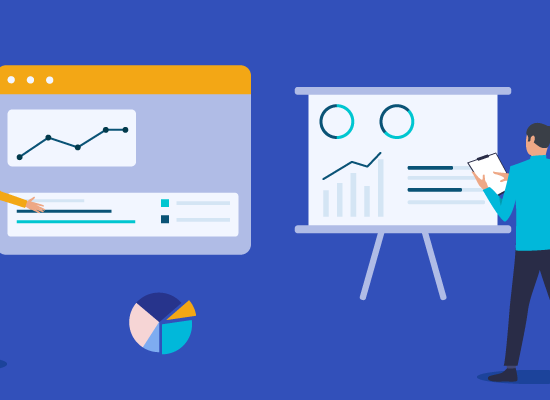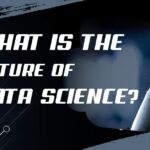
Can a Non-Technical Student Become a Data Scientist?
A non-technical student can become a data scientist you will need to have strong analytical and mathematical skills. You should be able to understand and work with complex data sets. It simply means that you’re an aspiring data science professional. Data science has become popular in recent years and with the demand of companies to access more data and trends, many students are trying their hand as with anything, you should be able to use statistical software packages and be familiar with programming languages such as Python or R Data Science is important. So, data has become the fuel of industries. It is the new electricity. Companies require data to function, grow and improve their businesses.
If you’ve ever wondered how to become a data scientist, this guide will give you a fast-track tutorial on how to get there. Here’s a quick overview of everything that’s been covered since we started.
As a data scientist, you will need to have a strong understanding of data collection, data preparation, data analysis, and data visualization. You will also need to have strong programming skills to be able to manipulate and analyze data.
Data science is a field that evolves at a faster pace than traditional statistical methods. This means that you’ll need to keep up and constantly learn new things. To become a data scientist, you need to have an understanding of how to extract insights from large data sets and present them back in a meaningful way to the business and beautifully represent them, and be good at storytelling. It is always good to have practical insight into any technology that you are working on.
However, even non-technical students can be successful data scientists if they are willing to put in the work.
There are many ways for a non-technical student to become a data scientist. which can provide the necessary skillset and training to work as a data scientist. Finally, many data scientists start their careers by working as data analysts. The ability to understand complex problems and find ways to solve them through data analysis or data engineer positions in larger companies.
 Discuss the skills and knowledge needed to become a data scientist.
Discuss the skills and knowledge needed to become a data scientist.
The skills you need to become a data scientist are quite diverse and can be gained through experience. In this article, we’ll take a deep look at all the different skills you need to get started in the exciting field of data science. A data scientist is a person who is skilled in the art of extracting valuable information from large sets of data. The field involves a lot of complex algorithms, artificial intelligence, and statistical principles that help people extract knowledge from data.
What are the prerequisites for becoming a data scientist?
The prerequisites for becoming a data scientist vary depending on the data scientist’s role and industry. However, some common prerequisites are often required for data scientist roles, such as in mathematics, statistics, or computer science. Additionally, many data scientists require experience working with data and code.
 Let us explain in detail…Mainly focus on these three major things
Let us explain in detail…Mainly focus on these three major things
Persistence is key when it comes to learning new things
-
Mathematics –
— linear algebra
— matrix algebra
–probability (accuracy, hypothesis testing (null hypothesis, alternative)
–statistical statistics (continuous data distributions (uniform, normal/gaussian distribution), discrete data distribution, moments.
-
Statistics –
–data types
–a measure of central tendency (mean, mode, median),
–measure of variability
–measurements of relationships between variables (co-variance, correlation)
-
Computer Science
— Python (NumPy, pandas, mat plot)
–machine learning (scikit-learn (SK learn), seaborn, Keres, tensor flow, SciPy)
— A tableau is a great tool for data visualization, and it integrates well with SQL Queries
Tableau provides different products Tableau can easily help you summarize your model metrics and it save time and helps you create better-looking visuals in less time. EDA is an important part of the data science tableau and is documented in the browser.
Define the role of a data scientist.
Data scientists are in high demand in the job market. This is due to their ability to make sense of large amounts of data and turn that data into actionable insights.
Data Scientists analyse large amounts of raw information to find patterns that will help improve our company & build data products to extract valuable business insights. In this role, you should be highly analytical with a knack for analysis, math, and statistics.
-
Excellent problem-solving skills.
Data scientists need to be able to find solutions to problems that have never been solved before. They need to be able to think critically and come up with new solutions to problems that have been encountered before.
-
Excellent modelling and data analysis skills.
A data scientist is responsible for developing and managing data-driven solutions. They work with a variety of data sources to identify trends and make informed decisions. They also use data to improve business processes and decision-making.
Data scientists need to be able to understand data in a way
To become a data scientist, you will need to have strong analytical and mathematical skills. You should be able to understand and work with complex data sets. Additionally, you should be able to use statistical software packages and be familiar with programming languages such as Python or R.
Data scientists typically have a broad background in math and statistics, but they also often have experience working in other fields where they are required to analyze large amounts of data and make decisions based on what they see. In fact, the term “data scientist” is often used interchangeably with “statistician” or “analyst”.
At its core, data science involves using quantitative techniques like statistical modelling, machine learning, and visualization tools to solve real-world problems. A typical day for a data scientist at an organization might involve:
Analyzing large datasets (e.g., social media posts) from multiple sources (e.g., news articles).
Implementing predictive models based on historical data sets (e.g., weather forecasts).
Presenting results from the analysis, including visualizations of results that provide insights into patterns in the data set (e.g., heatmaps highlighting where people are tweeting about politics). Finally, the data scientists need to know how to use statistical software packages such as SPSS and Excel. They should also know how to program in either Python or R (or both).
Discuss the different types of data scientists.
There are many different types of data scientists, each with their unique skill sets and abilities. Here are few types of data scientists:
1) Data Scientist as Statistician.
2) Data Scientist as Mathematician.
3) Data Scientists as Data Engineers.
4) Data Scientists as Machine Learning Scientists.
5) Data Scientist as Actuarial Scientist.
6) Data Scientists as Business Analytic Practitioners.
7) Data Scientist as Software Programming Analysts
8) Spatial Data Scientist
9) Data Scientist as Digital Analytic Consultant
10) Data Scientist as Quality Analyst
Data Scientist Salaries
According to Robert Half Technology’s 2022 Salary Guide, data scientists earn an average annual salary between $105,750 and $180,250 per year. However, can vary depending on location. For example, average salaries in cities across the United States include:
San Francisco: $121,836
Seattle: $108,399
New York: $101,387
Boston: $101,064
Los Angeles: $99,014
Austin: $96,495
Additionally, as data scientists gain experience, they often move into more senior positions with higher pay. These include:
Senior Data Scientist: $125,925
Data Science Manager: $135,401
Data Science Director: $157,273
Essential Data Science Skills
Most data scientists use the following core skills in their daily work:
Statistical analysis: Identify patterns in data. This includes having a keen sense of pattern detection and anomaly detection.
Machine learning: Implement algorithms and statistical models to enable a computer to automatically learn from data.
Computer science: Apply the principles of artificial intelligence, database systems, human/computer interaction, numerical analysis, and software engineering.
Programming: programs and analyse large datasets to uncover answers to complex problems. Data scientists need to be comfortable writing code working in a variety of languages such as Java, R, Python, and SQL.
Data storytelling: Communicate actionable insights using data, often for a non-technical audience.
Data scientists play a key role in helping organizations make sound decisions. As such, they need “soft skills” in the following areas.
Business intuition: Connect with stakeholders to gain a full understanding of the problems they’re looking to solve.
Analytical thinking: Find analytical solutions to abstract business issues.
Critical thinking: Apply objective analysis of facts before concluding.
Inquisitiveness: Look beyond what’s on the surface to discover patterns and solutions within the data.
Interpersonal skills: Communicate with a diverse audience across all levels of an organization.
Conclusion:
So, after knowing what exactly Data Science is and why it’s important, you have to explore further. So, data has become the fuel of industries. Companies use data to function, grow, and improve their businesses. Although the industry of data science is fairly new, it is already a major player in many industries. Data has become a vital resource for companies, and data scientists are essential to its success. “The goal is to turn data into information and information into insight”











